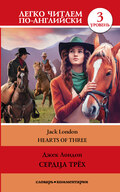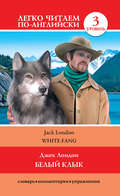
Джек Лондон
Adventure
CHAPTER XXIII – A MESSAGE FROM THE BUSH
Never had runaways from Berande been more zealously hunted. The deeds of Gogoomy and his fellows had been a bad example for the one hundred and fifty new recruits. Murder had been planned, a gang-boss had been killed, and the murderers had broken their contracts by fleeing to the bush. Sheldon saw how imperative it was to teach his new-caught cannibals that bad examples were disastrous things to pattern after, and he urged Seelee on night and day, while with the Tahitians he practically lived in the bush, leaving Joan in charge of the plantation. To the north Boucher did good work, twice turning the fugitives back when they attempted to gain the coast.
One by one the boys were captured. In the first man-drive through the mangrove swamp Seelee caught two. Circling around to the north, a third was wounded in the thigh by Boucher, and this one, dragging behind in the chase, was later gathered in by Seelee’s hunters. The three captives, heavily ironed, were exposed each day in the compound, as good examples of what happened to bad examples, all for the edification of the seven score and ten half-wild Poonga-Poonga men. Then the Minerva, running past for Tulagi, was signalled to send a boat, and the three prisoners were carried away to prison to await trial.
Five were still at large, but escape was impossible. They could not get down to the coast, nor dared they venture too far inland for fear of the wild bushmen. Then one of the five came in voluntarily and gave himself up, and Sheldon learned that Gogoomy and two others were all that were at large. There should have been a fourth, but according to the man who had given himself up, the fourth man had been killed and eaten. It had been fear of a similar fate that had driven him in. He was a Malu man, from north-western Malaita, as likewise had been the one that was eaten. Gogoomy’s two other companions were from Port Adams. As for himself, the black declared his preference for government trial and punishment to being eaten by his companions in the bush.
“Close up Gogoomy kai-kai me,” he said. “My word, me no like boy kai-kai me.”
Three days later Sheldon caught one of the boys, helpless from swamp fever, and unable to fight or run away. On the same day Seelee caught the second boy in similar condition. Gogoomy alone remained at large; and, as the pursuit closed in on him, he conquered his fear of the bushmen and headed straight in for the mountainous backbone of the island. Sheldon with four Tahitians, and Seelee with thirty of his hunters, followed Gogoomy’s trail a dozen miles into the open grass-lands, and then Seelee and his people lost heart. He confessed that neither he nor any of his tribe had ever ventured so far inland before, and he narrated, for Sheldon’s benefit, most horrible tales of the horrible bushmen. In the old days, he said, they had crossed the grass-lands and attacked the salt-water natives; but since the coming of the white men to the coast they had remained in their interior fastnesses, and no salt-water native had ever seen them again.
“Gogoomy he finish along them fella bushmen,” he assured Sheldon. “My word, he finish close up, kai-kai altogether.”
So the expedition turned back. Nothing could persuade the coast natives to venture farther, and Sheldon, with his four Tahitians, knew that it was madness to go on alone. So he stood waist-deep in the grass and looked regretfully across the rolling savannah and the soft-swelling foothills to the Lion’s Head, a massive peak of rock that upreared into the azure from the midmost centre of Guadalcanal, a landmark used for bearings by every coasting mariner, a mountain as yet untrod by the foot of a white man.
That night, after dinner, Sheldon and Joan were playing billiards, when Satan barked in the compound, and Lalaperu, sent to see, brought back a tired and travel-stained native, who wanted to talk with the “big fella white marster.” It was only the man’s insistence that procured him admittance at such an hour. Sheldon went out on the veranda to see him, and at first glance at the gaunt features and wasted body of the man knew that his errand was likely to prove important. Nevertheless, Sheldon demanded roughly, —
“What name you come along house belong me sun he go down?”
“Me Charley,” the man muttered apologetically and wearily. “Me stop along Binu.”
“Ah, Binu Charley, eh? Well, what name you talk along me? What place big fella marster along white man he stop?”
Joan and Sheldon together listened to the tale Binu Charley had brought. He described Tudor’s expedition up the Balesuna; the dragging of the boats up the rapids; the passage up the river where it threaded the grass-lands; the innumerable washings of gravel by the white men in search of gold; the first rolling foothills; the man-traps of spear-staked pits in the jungle trails; the first meeting with the bushmen, who had never seen tobacco, and knew not the virtues of smoking; their friendliness; the deeper penetration of the interior around the flanks of the Lion’s Head; the bush-sores and the fevers of the white men, and their madness in trusting the bushmen.
“Allee time I talk along white fella marster,” he said. “Me talk, ‘That fella bushman he look ’m eye belong him. He savvee too much. S’pose musket he stop along you, that fella bushman he too much good friend along you. Allee time he look sharp eye belong him. S’pose musket he no stop along you, my word, that fella bushman he chop ’m off head belong you. He kai-kai you altogether.’”
But the patience of the bushmen had exceeded that of the white men. The weeks had gone by, and no overt acts had been attempted. The bushmen swarmed in the camp in increasing numbers, and they were always making presents of yams and taro, of pig and fowl, and of wild fruits and vegetables. Whenever the gold-hunters moved their camp, the bushmen volunteered to carry the luggage. And the white men waxed ever more careless. They grew weary prospecting, and at the same time carrying their rifles and the heavy cartridge-belts, and the practice began of leaving their weapons behind them in camp.
“I tell ’m plenty fella white marster look sharp eye belong him. And plenty fella white marster make ’m big laugh along me, say Binu Charley allee same pickaninny – my word, they speak along me allee same pickaninny.”
Came the morning when Binu Charley noticed that the women and children had disappeared. Tudor, at the time, was lying in a stupor with fever in a late camp five miles away, the main camp having moved on those five miles in order to prospect an outcrop of likely quartz. Binu Charley was midway between the two camps when the absence of the women and children struck him as suspicious.
“My word,” he said, “me t’ink like hell. Him black Mary, him pickaninny, walk about long way big bit. What name? Me savvee too much trouble close up. Me fright like hell. Me run. My word, me run.”
Tudor, quite unconscious, was slung across his shoulder, and carried a mile down the trail. Here, hiding new trail, Binu Charley had carried him for a quarter of a mile into the heart of the deepest jungle, and hidden him in a big banyan tree. Returning to try to save the rifles and personal outfit, Binu Charley had seen a party of bushmen trotting down the trail, and had hidden in the bush. Here, and from the direction of the main camp, he had heard two rifle shots. And that was all. He had never seen the white men again, nor had he ventured near their old camp. He had gone back to Tudor, and hidden with him for a week, living on wild fruits and the few pigeons and cockatoos he had been able to shoot with bow and arrow. Then he had journeyed down to Berande to bring the news. Tudor, he said, was very sick, lying unconscious for days at a time, and, when in his right mind, too weak to help himself.
“What name you no kill ’m that big fella marster?” Joan demanded. “He have ’m good fella musket, plenty calico, plenty tobacco, plenty knife-fee, and two fella pickaninny musket shoot quick, bang-bang-bang – just like that.”
The black smiled cunningly.
“Me savvee too much. S’pose me kill ’m big fella marster, bimeby plenty white fella marster walk about Binu cross like hell. ‘What name this fellow musket?’ those plenty fella white marster talk ’m along me. My word, Binu Charley finish altogether. S’pose me kill ’m him, no good along me. Plenty white fella marster cross along me. S’pose me no kill ’m him, bimeby he give me plenty tobacco, plenty calico, plenty everything too much.”
“There is only the one thing to do,” Sheldon said to Joan.
She drummed with her hand and waited, while Binu Charley gazed wearily at her with unblinking eyes.
“I’ll start the first thing in the morning,” Sheldon said.
“We’ll start,” she corrected. “I can get twice as much out of my Tahitians as you can, and, besides, one white should never be alone under such circumstances.”
He shrugged his shoulders in token, not of consent, but of surrender, knowing the uselessness of attempting to argue the question with her, and consoling himself with the reflection that heaven alone knew what adventures she was liable to engage in if left alone on Berande for a week. He clapped his hands, and for the next quarter of an hour the house-boys were kept busy carrying messages to the barracks. A man was sent to Balesuna village to command old Seelee’s immediate presence. A boat’s-crew was started in a whale-boat with word for Boucher to come down. Ammunition was issued to the Tahitians, and the storeroom overhauled for a few days’ tinned provisions. Viaburi turned yellow when told that he was to accompany the expedition, and, to everybody’s surprise, Lalaperu volunteered to take his place.
Seelee arrived, proud in his importance that the great master of Berande should summon him in the night-time for council, and firm in his refusal to step one inch within the dread domain of the bushmen. As he said, if his opinion had been asked when the gold-hunters started, he would have foretold their disastrous end. There was only one thing that happened to any one who ventured into the bushmen’s territory, and that was that he was eaten. And he would further say, without being asked, that if Sheldon went up into the bush he would be eaten too.
Sheldon sent for a gang-boss and told him to bring ten of the biggest, best, and strongest Poonga-Poonga men.
“Not salt-water boys,” Sheldon cautioned, “but bush boys – leg belong him strong fella leg. Boy no savvee musket, no good. You bring ’m boy shoot musket strong fella.”
They were ten picked men that filed up on the veranda and stood in the glare of the lanterns. Their heavy, muscular legs advertised that they were bushmen. Each claimed long experience in bush-fighting, most of them showed scars of bullet or spear-thrust in proof, and all were wild for a chance to break the humdrum monotony of plantation labour by going on a killing expedition. Killing was their natural vocation, not wood-cutting; and while they would not have ventured the Guadalcanal bush alone, with a white man like Sheldon behind them, and a white Mary such as they knew Joan to be, they could expect a safe and delightful time. Besides, the great master had told them that the eight gigantic Tahitians were going along.
The Poonga-Poonga volunteers stood with glistening eyes and grinning faces, naked save for their loin-cloths, and barbarously ornamented. Each wore a flat, turtle-shell ring suspended through his nose, and each carried a clay pipe in an ear-hole or thrust inside a beaded biceps armlet. A pair of magnificent boar tusks graced the chest of one. On the chest of another hung a huge disc of polished fossil clam-shell.
“Plenty strong fella fight,” Sheldon warned them in conclusion.
They grinned and shifted delightedly.
“S’pose bushmen kai-kai along you?” he queried.
“No fear,” answered their spokesman, one Koogoo, a strapping, thick-lipped Ethiopian-looking man. “S’pose Poonga-Poonga boy kai-kai bush-boy?”
Sheldon shook his head, laughing, and dismissed them, and went to overhaul the dunnage-room for a small shelter tent for Joan’s use.
CHAPTER XXIV – IN THE BUSH
It was quite a formidable expedition that departed from Berande at break of day next morning in a fleet of canoes and dinghies. There were Joan and Sheldon, with Binu Charley and Lalaperu, the eight Tahitians, and the ten Poonga-Poonga men, each proud in the possession of a bright and shining modern rifle. In addition, there were two of the plantation boat’s-crews of six men each. These, however, were to go no farther than Carli, where water transportation ceased and where they were to wait with the boats. Boucher remained behind in charge of Berande.
By eleven in the morning the expedition arrived at Binu, a cluster of twenty houses on the river bank. And from here thirty odd Binu men accompanied them, armed with spears and arrows, chattering and grimacing with delight at the warlike array. The long quiet stretches of river gave way to swifter water, and progress was slower and more dogged. The Balesuna grew shallow as well, and oftener were the loaded boats bumped along and half-lifted over the bottom. In places timber-falls blocked the passage of the narrow stream, and the boats and canoes were portaged around. Night brought them to Carli, and they had the satisfaction of knowing that they had accomplished in one day what had required two days for Tudor’s expedition.
Here at Carli, next morning, half-way through the grass-lands, the boat’s-crews were left, and with them the horde of Binu men, the boldest of which held on for a bare mile and then ran scampering back. Binu Charley, however, was at the fore, and led the way onward into the rolling foothills, following the trail made by Tudor and his men weeks before. That night they camped well into the hills and deep in the tropic jungle. The third day found them on the run-ways of the bushmen – narrow paths that compelled single file and that turned and twisted with endless convolutions through the dense undergrowth. For the most part it was a silent forest, lush and dank, where only occasionally a wood-pigeon cooed or snow-white cockatoos laughed harshly in laborious flight.
Here, in the mid-morning, the first casualty occurred. Binu Charley had dropped behind for a time, and Koogoo, the Poonga-Poonga man who had boasted that he would eat the bushmen, was in the lead. Joan and Sheldon heard the twanging thrum and saw Koogoo throw out his arms, at the same time dropping his rifle, stumble forward, and sink down on his hands and knees. Between his naked shoulders, low down and to the left, appeared the bone-barbed head of an arrow. He had been shot through and through. Cocked rifles swept the bush with nervous apprehension. But there was no rustle, no movement; nothing but the humid oppressive silence.
“Bushmen he no stop,” Binu Charley called out, the sound of his voice startling more than one of them. “Allee same damn funny business. That fella Koogoo no look ’m eye belong him. He no savvee little bit.”
Koogoo’s arms had crumpled under him, and he lay quivering where he had fallen. Even as Binu Charley came to the front the stricken black’s breath passed from him, and with a final convulsive stir he lay still.
“Right through the heart,” Sheldon said, straightening up from the stooping examination. “It must have been a trap of some sort.”
He noticed Joan’s white, tense face, and the wide eyes with which she stared at the wreck of what had been a man the minute before.
“I recruited that boy myself,” she said in a whisper. “He came down out of the bush at Poonga-Poonga and right on board the Martha and offered himself. And I was proud. He was my very first recruit – ”
“My word! Look ’m that fella,” Binu Charley interrupted, brushing aside the leafy wall of the run-way and exposing a bow so massive that no one bushman could have bent it.
The Binu man traced out the mechanics of the trap, and exposed the hidden fibre in the tangled undergrowth that at contact with Koogoo’s foot had released the taut bow.
They were deep in the primeval forest. A dim twilight prevailed, for no random shaft of sunlight broke through the thick roof of leaves and creepers overhead. The Tahitians were plainly awed by the silence and gloom and mystery of the place and happening, but they showed themselves doggedly unafraid, and were for pushing on. The Poonga-Poonga men, on the contrary, were not awed. They were bushmen themselves, and they were used to this silent warfare, though the devices were different from those employed by them in their own bush. Most awed of all were Joan and Sheldon, but, being whites, they were not supposed to be subject to such commonplace emotions, and their task was to carry the situation off with careless bravado as befitted “big fella marsters” of the dominant breed.
Binu Charley took the lead as they pushed on, and trap after trap yielded its secret lurking-place to his keen scrutiny. The way was beset with a thousand annoyances, chiefest among which were thorns, cunningly concealed, that penetrated the bare feet of the invaders. Once, during the afternoon, Binu Charley barely missed being impaled in a staked pit that undermined the trail. There were times when all stood still and waited for half an hour or more while Binu Charley prospected suspicious parts of the trail. Sometimes he was compelled to leave the trail and creep and climb through the jungle so as to approach the man-traps from behind; and on one occasion, in spite of his precaution, a spring-bow was discharged, the flying arrow barely clipping the shoulder of one of the waiting Poonga-Poonga boys.
Where a slight run-way entered the main one, Sheldon paused and asked Binu Charley if he knew where it led.
“Plenty bush fella garden he stop along there short way little bit,” was the answer. “All right you like ’m go look ’m along.”
“’Walk ’m easy,” he cautioned, a few minutes later. “Close up, that fella garden. S’pose some bush fella he stop, we catch ’m.”
Creeping ahead and peering into the clearing for a moment, Binu Charley beckoned Sheldon to come on cautiously. Joan crouched beside him, and together they peeped out. The cleared space was fully half an acre in extent and carefully fenced against the wild pigs. Paw-paw and banana-trees were just ripening their fruit, while beneath grew sweet potatoes and yams. On one edge of the clearing was a small grass house, open-sided, a mere rain-shelter. In front of it, crouched on his hams before a fire, was a gaunt and bearded bushman. The fire seemed to smoke excessively, and in the thick of the smoke a round dark object hung suspended. The bushman seemed absorbed in contemplation of this object.
Warning them not to shoot unless the man was successfully escaping, Sheldon beckoned the Poonga-Poonga men forward. Joan smiled appreciatively to Sheldon. It was head-hunters against head-hunters. The blacks trod noiselessly to their stations, which were arranged so that they could spring simultaneously into the open. Their faces were keen and serious, their eyes eloquent with the ecstasy of living that was upon them – for this was living, this game of life and death, and to them it was the only game a man should play, withal they played it in low and cowardly ways, killing from behind in the dim forest gloom and rarely coming out into the open.
Sheldon whispered the word, and the ten runners leaped forward – for Binu Charley ran with them. The bushman’s keen ears warned him, and he sprang to his feet, bow and arrow in hand, the arrow fixed in the notch and the bow bending as he sprang. The man he let drive at dodged the arrow, and before he could shoot another his enemies were upon him. He was rolled over and over and dragged to his feet, disarmed and helpless.
“Why, he’s an ancient Babylonian!” Joan cried, regarding him. “He’s an Assyrian, a Phoenician! Look at that straight nose, that narrow face, those high cheek-bones – and that slanting, oval forehead, and the beard, and the eyes, too.”
“And the snaky locks,” Sheldon laughed.
The bushman was in mortal fear, led by all his training to expect nothing less than death; yet he did not cower away from them. Instead, he returned their looks with lean self-sufficiency, and finally centred his gaze upon Joan, the first white woman he had ever seen.
“My word, bush fella kai-kai along that fella boy,” Binu Charley remarked.
So stolid was his manner of utterance that Joan turned carelessly to see what had attracted his attention, and found herself face to face with Gogoomy. At least, it was the head of Gogoomy – the dark object they had seen hanging in the smoke. It was fresh – the smoke-curing had just begun – and, save for the closed eyes, all the sullen handsomeness and animal virility of the boy, as Joan had known it, was still to be seen in the monstrous thing that twisted and dangled in the eddying smoke.
Nor was Joan’s horror lessened by the conduct of the Poonga-Poonga boys. On the instant they recognized the head, and on the instant rose their wild hearty laughter as they explained to one another in shrill falsetto voices. Gogoomy’s end was a joke. He had been foiled in his attempt to escape. He had played the game and lost. And what greater joke could there be than that the bushmen should have eaten him? It was the funniest incident that had come under their notice in many a day. And to them there was certainly nothing unusual nor bizarre in the event. Gogoomy had completed the life-cycle of the bushman. He had taken heads, and now his own head had been taken. He had eaten men, and now he had been eaten by men.
The Poonga-Poonga men’s laughter died down, and they regarded the spectacle with glittering eyes and gluttonous expressions. The Tahitians, on the other hand, were shocked, and Adamu Adam was shaking his head slowly and grunting forth his disgust. Joan was angry. Her face was white, but in each cheek was a vivid spray of red. Disgust had been displaced by wrath, and her mood was clearly vengeful.
Sheldon laughed.
“It’s nothing to be angry over,” he said. “You mustn’t forget that he hacked off Kwaque’s head, and that he ate one of his own comrades that ran away with him. Besides, he was born to it. He has but been eaten out of the same trough from which he himself has eaten.”
Joan looked at him with lips that trembled on the verge of speech.
“And don’t forget,” Sheldon added, “that he is the son of a chief, and that as sure as fate his Port Adams tribesmen will take a white man’s head in payment.”
“It is all so ghastly ridiculous,” Joan finally said.
“And – er – romantic,” he suggested slyly.
She did not answer, and turned away; but Sheldon knew that the shaft had gone home.
“That fella boy he sick, belly belong him walk about,” Binu Charley said, pointing to the Poonga-Poonga man whose shoulder had been scratched by the arrow an hour before.
The boy was sitting down and groaning, his arms clasping his bent knees, his head drooped forward and rolling painfully back and forth. For fear of poison, Sheldon had immediately scarified the wound and injected permanganate of potash; but in spite of the precaution the shoulder was swelling rapidly.
“We’ll take him on to where Tudor is lying,” Joan said. “The walking will help to keep up his circulation and scatter the poison. Adamu Adam, you take hold that boy. Maybe he will want to sleep. Shake him up. If he sleep he die.”
The advance was more rapid now, for Binu Charley placed the captive bushman in front of him and made him clear the run-way of traps. Once, at a sharp turn where a man’s shoulder would unavoidably brush against a screen of leaves, the bushman displayed great caution as he spread the leaves aside and exposed the head of a sharp-pointed spear, so set that the casual passer-by would receive at the least a nasty scratch.
“My word,” said Binu Charley, “that fella spear allee same devil-devil.”
He took the spear and was examining it when suddenly he made as if to stick it into the bushman. It was a bit of simulated playfulness, but the bushman sprang back in evident fright. Poisoned the weapon was beyond any doubt, and thereafter Binu Charley carried it threateningly at the prisoner’s back.
The sun, sinking behind a lofty western peak, brought on an early but lingering twilight, and the expedition plodded on through the evil forest – the place of mystery and fear, of death swift and silent and horrible, of brutish appetite and degraded instinct, of human life that still wallowed in the primeval slime, of savagery degenerate and abysmal. No slightest breezes blew in the gloomy silence, and the air was stale and humid and suffocating. The sweat poured unceasingly from their bodies, and in their nostrils was the heavy smell of rotting vegetation and of black earth that was a-crawl with fecund life.
They turned aside from the run-way at a place indicated by Binu Charley, and, sometimes crawling on hands and knees through the damp black muck, at other times creeping and climbing through the tangled undergrowth a dozen feet from the ground, they came to an immense banyan tree, half an acre in extent, that made in the innermost heart of the jungle a denser jungle of its own. From out of its black depths came the voice of a man singing in a cracked, eerie voice.
“My word, that big fella marster he no die!”
The singing stopped, and the voice, faint and weak, called out a hello. Joan answered, and then the voice explained.
“I’m not wandering. I was just singing to keep my spirits up. Have you got anything to eat?”
A few minutes saw the rescued man lying among blankets, while fires were building, water was being carried, Joan’s tent was going up, and Lalaperu was overhauling the packs and opening tins of provisions. Tudor, having pulled through the fever and started to mend, was still frightfully weak and very much starved. So badly swollen was he from mosquito-bites that his face was unrecognizable, and the acceptance of his identity was largely a matter of faith. Joan had her own ointments along, and she prefaced their application by fomenting his swollen features with hot cloths. Sheldon, with an eye to the camp and the preparations for the night, looked on and felt the pangs of jealousy at every contact of her hands with Tudor’s face and body. Somehow, engaged in their healing ministrations, they no longer seemed to him boy’s hands, the hands of Joan who had gazed at Gogoomy’s head with pale cheeks sprayed with angry flame. The hands were now a woman’s hands, and Sheldon grinned to himself as his fancy suggested that some night he must lie outside the mosquito-netting in order to have Joan apply soothing fomentations in the morning.






